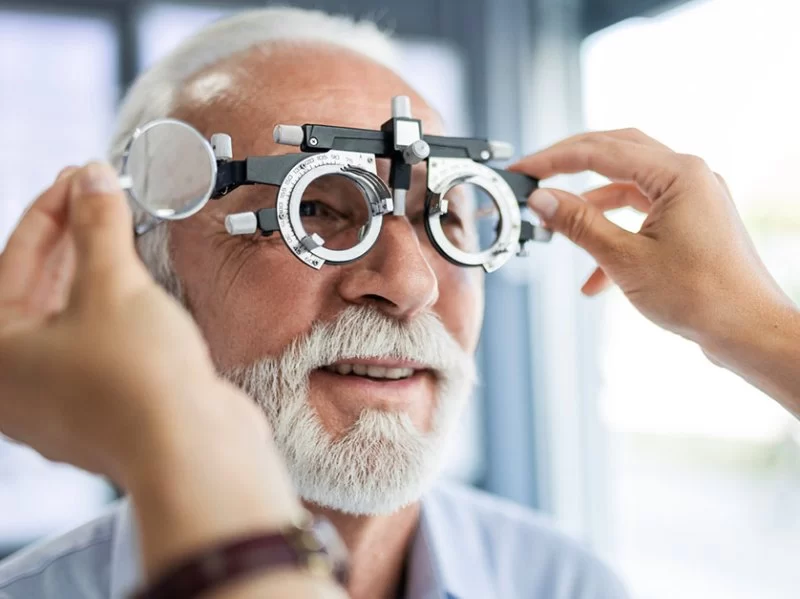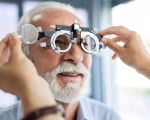
- why-regular-eye-exams-matter-for-seniors
- age-related-eye-conditions-that-need-early-detection
- real-stories-from-seniors-who-caught-problems-early
- how-eye-exams-support-overall-health
- how-to-make-eye-care-easy-for-seniors
- why-eye-docs-is-a-trusted-name-in-senior-eye-care
1. Why Regular Eye Exams Matter for Seniors
As we age, our vision naturally changes—but those changes aren’t always harmless. The importance of regular eye exams for seniors lies in their power to detect conditions early, preserve independence, and even prevent blindness. A routine eye exam is far more than just a check for new glasses—it's a window into overall health and aging.
Many seniors may not notice vision loss until it's advanced. Regular screenings allow optometrists to monitor subtle shifts and catch signs of issues like cataracts, glaucoma, or macular degeneration before they become debilitating. Protecting your eyesight in your 60s, 70s, and beyond is essential for maintaining quality of life.
2. Age-Related Eye Conditions That Need Early Detection
2.1 Cataracts
Cataracts are one of the most common causes of vision decline in seniors. Characterized by cloudy or blurred vision, they develop slowly and are often undetected in early stages without an exam. Left untreated, they can lead to significant vision loss. Fortunately, cataracts are highly treatable with early diagnosis and surgical options.
2.2 Age-Related Macular Degeneration (AMD)
AMD affects central vision, making tasks like reading or recognizing faces difficult. It’s a leading cause of blindness in seniors over 60. With regular eye exams, early-stage AMD can be managed with diet, lifestyle changes, and medical treatment to slow its progression.
2.3 Glaucoma
Known as the “silent thief of sight,” glaucoma often has no noticeable symptoms until significant vision has been lost. Eye pressure tests during routine exams can detect this disease early, preventing irreversible damage through medication or surgical intervention.
3. Real Stories from Seniors Who Caught Problems Early
3.1 Betty’s Battle with Glaucoma
Betty, a 72-year-old retired nurse, scheduled an eye exam after noticing some mild eye strain. Her optometrist detected unusually high eye pressure, a warning sign of glaucoma. With timely diagnosis and daily eye drops, Betty preserved her vision. “I had no idea anything was wrong—I’m so glad I didn’t put it off,” she recalls.
3.2 George and the Hidden Cataracts
George thought he was just “getting older” when street signs became harder to read at night. During a routine checkup, his optometrist identified early cataracts in both eyes. After surgery, George was thrilled. “I hadn’t seen this clearly in years—I thought it was just age catching up,” he said.
4. How Eye Exams Support Overall Health
4.1 Detecting More Than Just Eye Issues
A comprehensive eye exam can reveal signs of systemic health issues like high blood pressure, diabetes, and even stroke risk. Because blood vessels in the eyes mirror those in the rest of the body, optometrists can often detect problems long before symptoms appear elsewhere.
4.2 Preserving Independence
For seniors, vision means more than reading—it means driving safely, managing medications, and avoiding falls. Regular eye exams are directly linked to seniors staying independent longer. Clear vision helps reduce accidents and supports cognitive engagement through reading and social interaction.
4.3 Mental and Emotional Well-being
Vision loss can lead to social isolation, depression, and cognitive decline. Preventing this through early intervention is not just a medical responsibility—it’s a human one. Maintaining vision means maintaining dignity, mobility, and connection to the world.
5. How to Make Eye Care Easy for Seniors
5.1 Set a Consistent Schedule
Experts recommend seniors have a comprehensive eye exam at least once a year. Mark it on the calendar or schedule it alongside annual physicals to keep it top of mind. Routine keeps eye care proactive instead of reactive.
5.2 Bring a List of Concerns
Before appointments, jot down any recent vision changes, eye discomfort, or health updates. This helps optometrists tailor their screening and ensures nothing important is overlooked. Family members can help by attending appointments and advocating for follow-up if needed.
5.3 Choose a Senior-Friendly Eye Clinic
Look for clinics that specialize in senior care—places that offer accessible exam rooms, extra time for appointments, and a calming, respectful environment. At Eye Docs, we understand how to meet these needs with compassion and expertise.
6. Why Eye Docs Is a Trusted Name in Senior Eye Care
At Eye Docs, we believe that protecting your vision means protecting your freedom, health, and happiness. Our team specializes in eye care for seniors, using state-of-the-art diagnostic tools and personalized care plans to keep your eyes at their best.
Whether you're managing a chronic condition or just staying ahead of age-related changes, Eye Docs is here to support your journey. We treat our senior clients like family—because great vision deserves great care at every stage of life.








